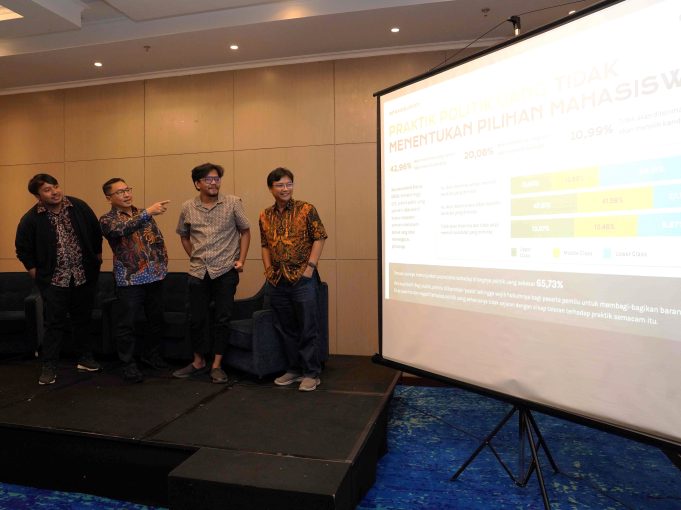
Jakarta, January 15th 2024─Collaborative research of Election Corner (EC) Fisipol UGM with #PraxiSurvey shows that 42.96% of students stated that they would accept money but not vote for candidates. Furthermore, 20.08% of students will accept money and will vote for candidates, while another 10.99% stated that they would not accept money and would not vote for candidates.
Entitled “Student Aspirations and Preferences for the 2024 Election”, this research was conducted using a mixed method approach. The survey was conducted among 1,001 students aged 16-25 years in 34 provinces in Indonesia on January 1st to 8th, 2024. Then, an in-depth study in the format of Focus Group Discussion (FGD) was held on January 15th, 2024 involving four academics and students representing the University of Indonesia (UI), Universitas Gadjah Mada (UGM), Mulawarman University (Unmul), and Nusa Cendana University (Undana).
Lecturer in the Department of Politics and Government of the Faculty of Social and Political Sciences UGM, Arga Pribadi Imawan, explained the reason why students still accept money even though the majority will not vote, “In the midst of assumptions about young people’s penchant for money politics, young people will tend to accept money and vote for candidates who give money, the survey results actually show that young people are still rational in making their choices.” He continued, “Elections are likened to a ‘party’, so giving and receiving money or goods is considered something that must or is natural to do.”
Analysis by Socioeconomic Status (SES) shows that the higher the SES, the less effective money politics practices are. The data reported that 15.94% of the upper class, 19.89% of the middle class, and 29.21% of the lower class admitted that they would accept money and vote for the requested candidate. On the other hand, 47.51% of the upper class, 41.98% of the middle class, and 27.12% of the lower class said they would accept money but not vote for the candidate. Meanwhile, 13.07% of the upper class, 10.46% of the middle class, and 9.87% of the lower class said they would accept money but not vote for the requested candidate. Another finding is that 65.73% of students are pessimistic that the practice of money politics can be eliminated in the implementation of elections in Indonesia.
In addition, the research also found a number of notes. Candidates with a politician background get the highest preference from students (20.88%), while public figures/celebrities get the lowest (0.50%). Online media is the main source of political information for students (66.43%), while out of home (OOH) advertisements such as billboards are less relevant (21.08%). When viewing candidates on social media, students are most interested in candidates’ statements (66.43%) and their public speaking skills (63.14%). This is in line with the preference for the most influential campaign activity, which is open debates (69.93%).
Lastly, Chairman of the Department of Politics and Government and coordinator of EC Faculty of Social and Political Sciences of UGM, Abdul Gaffar Karim, said it was important to understand the aspirations of students who strategically affect the election results, considering the data from the General Election Commission (KPU) outlines the Permanent Voter List (DPT) of young people reaching 53%. “I really appreciate the collaboration between Praxis and EC in this research. Hopefully the research results can be useful for the community and stakeholders in this year’s elections.”
